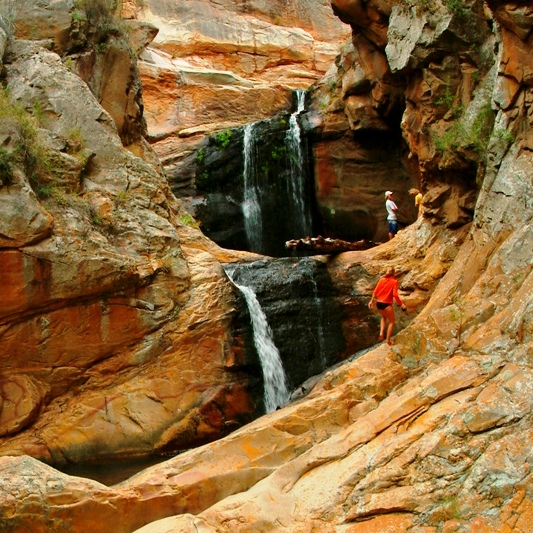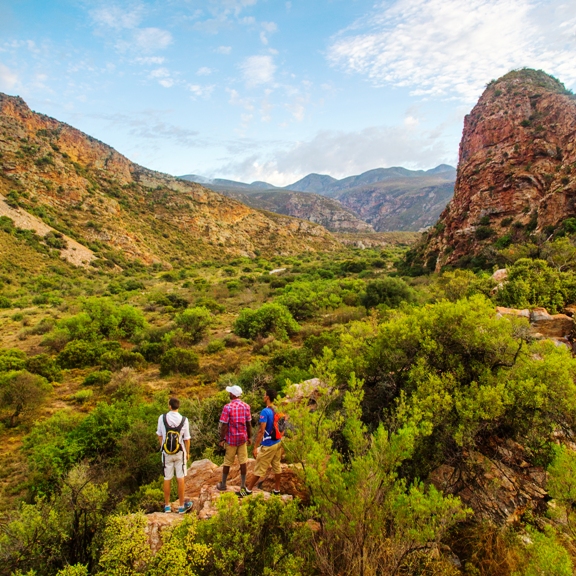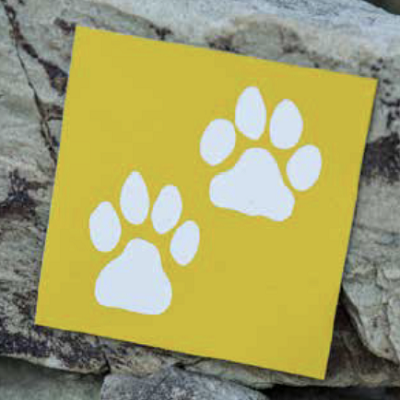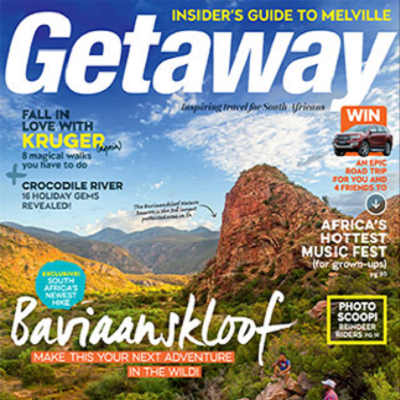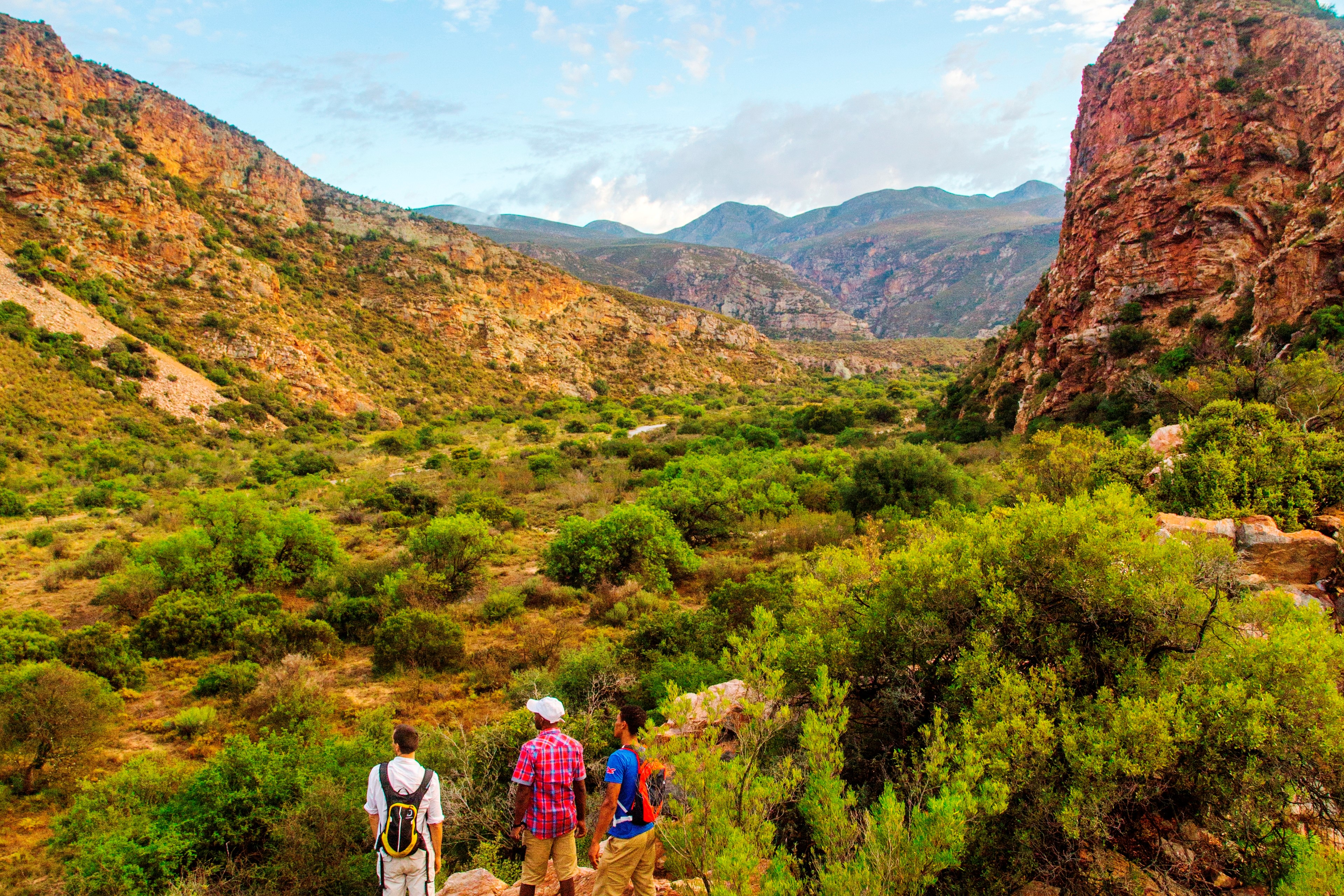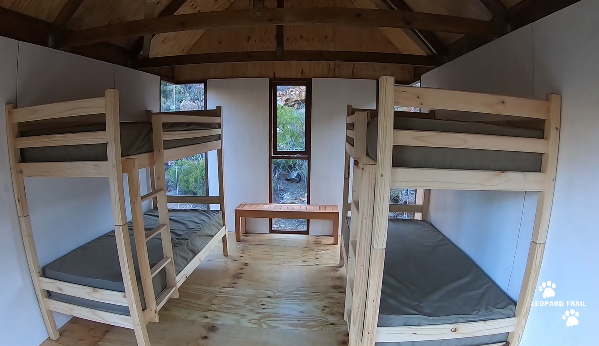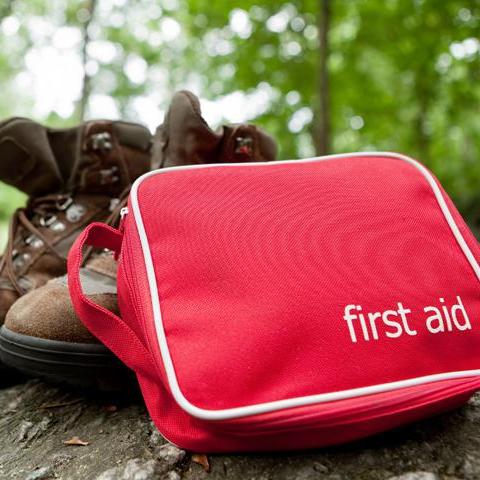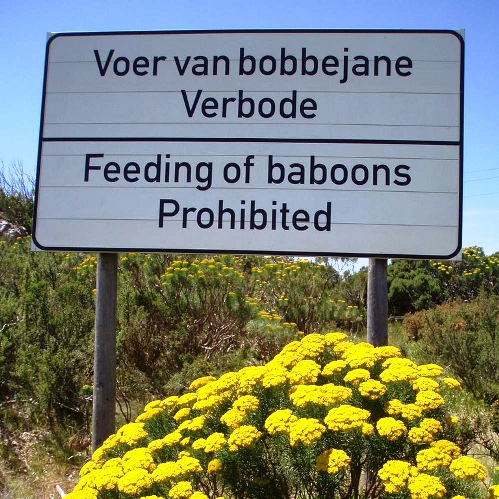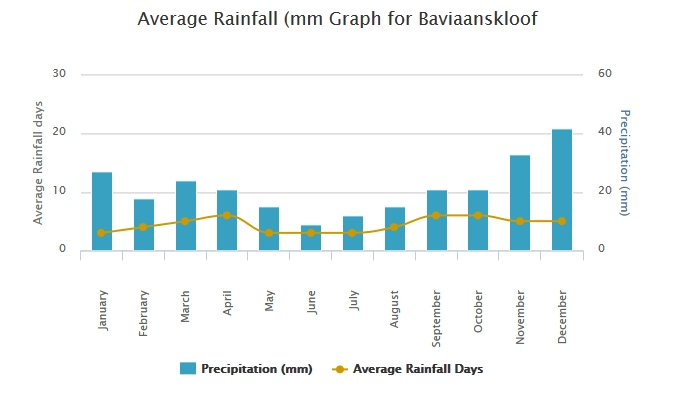Welcome to the Leopard Trail

Booking currently open until June 2026.
Next block of bookings open on the 28th July
for
July – September 2026.
R3 200 per person
Bookings made per sleeping unit for 4 people.
Quick Overview
The Leopard Trail is a 4-day and 3-night hike set in the magnificent Baviaanskloof World Heritage Site Wilderness Reserve. This is a slackpacking hike – each day we transport your bags and food from one overnight hut to the next, leaving you to walk with only a day pack.
The Leopard Trail is a moderately difficult hike with the longest day being 22km. The route is designed for people of good hiking fitness.
R12800 per sleeping hut for 4 people, (R3200 per person)
Booking for the Leopard Trail
How Bookings Work
- Bookings are made per sleeping hut, not per person.
- There are 3 sleeping huts, and each hut sleeps 4 people.
- All hikers share a communal cooking hut, regardless of how many huts are booked.
Booking Releases
- Bookings open one year in advance, and are released in 3-month blocks.
Example: In October this year, bookings for October, November, and December next year will open.
Two-Stage Booking Process
Stage 1
- To secure a start date during Stage 1, you must book at least 2 huts.
- If you want the trail exclusively for your group, you can book all 3 huts.
- If you only book 2 huts, you’ll have until the start of Stage 2 (4 weeks later) to book the 3rd hut and secure exclusivity.
- If you don’t book the 3rd hut by then, it becomes available to another group during Stage 2.
Stage 2
- Starts 4 weeks after Stage 1 bookings open.
- Any remaining single huts not booked in Stage 1 become available.
- This allows smaller groups to book one hut and share the trail with those that booked during stage 1.
The Leopard Trail is an excellent slack packing hike, overnighting in fantastic hiking huts.
Slack Packing Multi Day Hike
This is true wilderness hiking. A single-track path meanders through the inaccessible mountains of SA’s third largest wilderness area.
With the Baviaanskloof hosting 7 of SA’s 8 biomes, the Leopard Trail offers an unparralled diversity of landscapes.
The Leopard Trail was designed for hikers by hikers. The trail and and overnight sites were purposely created to inspire WOW, and to connect hikers to the magic of true wilderness.
Add an extra bonus day
There is an optional bonus 5th day you can add to your Leopard Trail hike.
The magnificent Cedar Falls Day Hike really should not be missed. Getaway Magazine described the Cedar Falls Day Hike as “One of those moments of extremely beautiful life!”
This hike leaves from the Cedar Falls Base Camp (where you start and finish The Leopard Trail). Book yourself into one of the accommodation options at Cedar Falls either before or after your Leopard Trail hike, and enjoy the magic of Cedar Falls!
More info on the Leopard Trail
Slack-Packing The Leopard Trail
We transport your bags so you can walk with just a day pack with the essentials for a days hike. You are provided plastic boxes, and we recommend that you put everything you want transported inside the boxes. These protect your belongings from rubbing and bouncing on the rough roads between the overnight sites. We recommend you do not put valuables such as laptops and cameras in your bags – rather leave them in your car at the Base Camp where they will be safe, or carry them with you. Dimensions for the boxes are 465mm x 736mm, and 350mm deep. Please note that we do not offer laundry service, make sure to pack what you need for the duration of the hike.
Bag Drop off times: Our aim is to ensure that those on the last day of the trail and planning to leave by lunch time get their bags in good time. Our schedule for dropping off bags looks like this: (sometimes they may be a little late or early – our vehicle travels rough terrain, and we may have to wait for a hiker or two). Camp 1: 3pm. Camp 2: 4pm. Camp 3: 11am. Base Camp Final Day delivered to the reception area: Noon. Please note for day 1, the boxes are collected from base camp for camp 1 at 2pm sharp. Please insure that you are at base camp with plenty of time to pack your boxes, sign indemnities and listen to trail briefing.
Overnight Sites
Our overnight sites each have a three sleeping huts (sleeping 4 per hut) and one central catering hut. The catering huts are there to give you a communal space for your group to hang out, make food and have a great time with your hiking mates. There is some solar lighting in the catering huts. Inside each catering hut are gas stove tops, cooking and eating utensils – no need to bring those along. There is also a wood burning fireplace. Each site has a braai area and braai grid. Each site has a splash pool.
The sleeping huts have mattresses – all you need is a sleeping bag and pillow. If you are going to sleep outside of your sleeping bag, or open it up, you will need to bring a single sheet to cover the mattress.
The nights are very dark and no lamps are provided, so torches and headlamps are required. No open flames such as candles are allowed in the huts.
You will need to clean all the kitchen equipment and utensils before leaving in the morning – the next group of hikers will appreciate it.
Each campsite has a flush toilet, and solar/gas geyser showers.
Water
There are water tanks at each overnight campsite that provide water for drinking, cooking, washing dishes, and hot water showers. This water is piped in from the nearest mountain streams and is good to drink. Depending on the season and local rainfall, you may be lucky and find streams and springs along the length of The Leopard Trail. Currently, the Eastern Cape is experiencing a drought, so do not expect to find water on route. However, each campsite has a small pool.
Fires
Fires are only allowed in the fire places provided. Firewood is provided. Please do not collect wood from the natural environment. Dead bushes and branches provide important habitat for a wide variety of insects and animals, and are a vital part of the fire load in the veld for natural burning cycles.
This is a high-risk fire area. Please ensure that your fires and coals are completely doused any time you leave the fire area – at night and in the morning. Water is provided for this purpose.
Important Safety Considerations
There is no cell phone reception on the trail, and very little vehicle access, so it is difficult to let us know of emergencies in a hurry. This is a risk you accept when walking the Leopard Trail. The Leopard Trail goes through natural wilderness with all the risks associated with wild animals, snakes, insects, unpredictable weather and a strenuous hike. Carry the following safety items with you: first aid kit, survival bag, thermal blanket.
In the event of an emergency, ensure that someone remains with the person/people affected while at least two people return to Base Camp or the nearest emergency exit. The route from each campsite to the nearest emergency exit is marked.
- From Camp 1 a 2.6 km trail leads to the main Baviaanskloof Road.
- From Camp 2 a 1.1 km trail leads to Base Camp.
- From Camp 3 a 3.2 km trail leads to the main Baviaanskloof Road and Reserve Ranger’s house.
In the event of mountain fires or floods, stay together and use your best judgement as to the safest course of action. We will be doing our best to come to your aid. Seek natural shelter and avoid high areas during dangerous weather such as thunderstorms.
The area has a variety of venomous snakes, including puffadders and Cape cobra. Refresh your knowledge of how to handle snake/spider bites and scorpion stings. Leopard spoor is often seen on the trail, and very occasionally you may catch a glimpse of one of these shy creatures during the day. There are no rhino or buffalo in our part of the Baviaanskloof Mega Reserve.
Baboons in the area still have their natural caution and fear of humans. They will move away when they see hikers. They do not come to the campsites looking for human food. Your support and cooperation in this regard is very important. Please do not feed the baboons. Do not leave food out or throw scraps into the bushes. When you leave the campsites each morning, ensure that the rubbish bins, as well as the bins in which your food is being transported, have been closed with the cable ties provided.
When to Hike and the Weather
The Leopard Trail is a great hike at any time of year.
Summer is hot with the daily average in December, January and February at 26 degrees Celsius. Days can get up to the high 30s, so be prepared to walk in the early mornings and late afternoons, spending your midday hours at the lunchtime mountain pools. Each camp has a pool with clear mountain water, making a summer hike a great opportunity to hike early and spend the day swimming and relaxing at the camp sites.
Autumn and Spring (March, April, May, September, October and November) can provide great fair weather hiking, with average temperatures in the early 20s. As winter approaches, an occasional cold front will blow through, dropping temperatures considerably. The swimming pools are great on the hot days, while the fire places inside the communal huts keep you warm on cold days. The flowers in Spring are spectacular on the trail.
Winter is a favorite for many hikers with cool days hiking if you don’t like the heat. The fire places in the communal hut are a winner, with groups gathering together around the fire with warm drinks and good times. Temperatures in June, July and August average around 16 degrees Celsius. Nights drop to zero though, so make sure you have a warm sleeping bag to sleep well on our great mattresses.
Rain in the Baviaanskloof is an unpredictable affair. All months of the year have only around 4 days of rain so, statistically, your chances of dry weather are pretty good.
Like all mountain areas, the Baviaanskloof can experience a range of weather conditions over any 4-day period. You are advised to prepare for rain, wind, cold and heat.
Age and Fitness
The Leopard Trail is a relatively difficult hike, with the longest day being 22km. The hike is designed for people of good hiking fitness. Unfit hikers should not attempt the trail.
The recommended age range of 12 to 65 years is used as indicative, due to the physical demands of the trail. We will not stop hikers outside of this age range except children under the age of 6 – but encourage you to be realistic about your own ability and limits. All hikers 6 to 12 years of age must be accompanied by their parents/guardians who will be legal signatories to Indemnity Forms (to be submitted with copies of their identity document or passport at The Leopard Trail reception desk before undertaking the trail). There are relatively steep ascents and descents, so please be cautious if you have previously injured your ankles and/or knees.
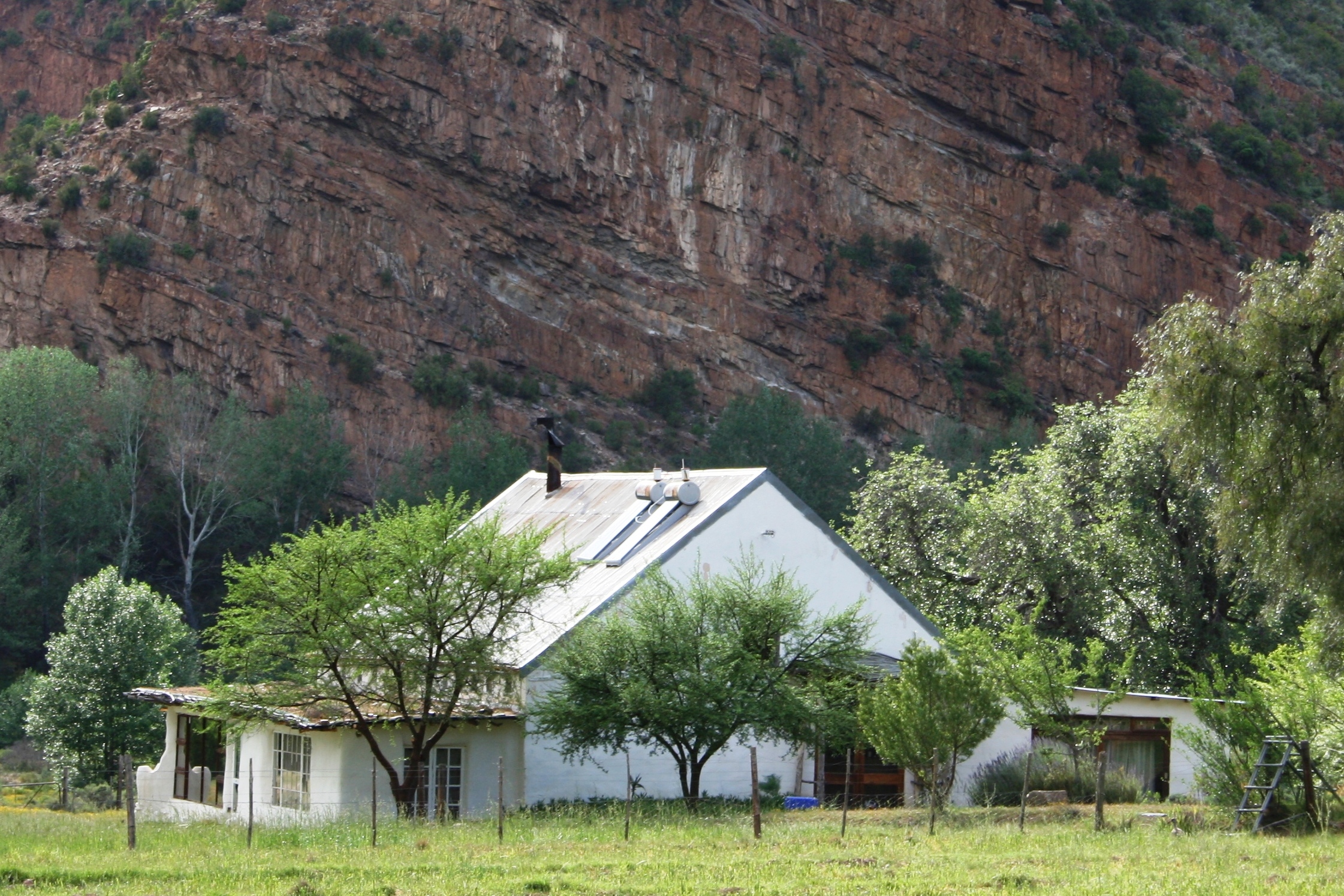

Base Camp Accommodation
For those travelling from afar, or those not wanting to be rushed on day 1 or 4, we have a range of accommodation options at the Cedar Falls Base Camp. Put your feet up, take a rewarding hot shower, relive your hike with your group and then fall asleep knowing you will awake in beauty of the Baviaans.
Want some time out with your partner – alone – after 4 days of hiking with 10 other people – stay at one of our romantic cottages.
Baviaanskloof World Heritage Site Reserve
The Leopard Trail is set inside the Baviaanskloof Reserve owned and managed by the Eastern Cape Parks and Tourism Agency. The trail is run by the Another Way Trust, a community development organisation, on a long term concession.
The Leopard Trail is an eco-tourism product that demonstrates how government and private initiative can work together for the benefit of our communities and the development of tourism in our province. By ensuring an enabling environment within the provincial parks, the Eastern Cape Parks and Tourism Agency (ECPTA) entered into an agreement with Another Way Trust allowing them to create and operate the Leopard Trail within the Reserve.
Located at Baviaanskloof World Heritage Site, the Leopard Trail is steadily growing to be one of the top multi-day slackpacking hiking products. Through leveraging resources from the government, the Eastern Cape Parks and Tourism Agency facilitated investment into new facilities for the trail which include hikers hut, ablution facilities, communal swimming pools and hut. This investment further enhanced the attractiveness and competitiveness of the trail.
The ECPTA is further looking to work with the private sector to further maximize benefits for local communities. These ecotourism initiatives are pursued with the objectives of ensuring that they benefit local communities, ensure environmental sustainability and contribute to revenue generation.
Leopard Trail Hike
How can we help? WhatsApp Catherine on 074 939 4395 or email reservations@gobaviaans.co.za
